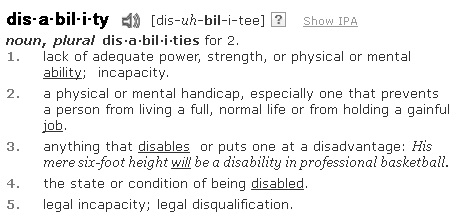Autism: A Disability?
It is taken for granted that autism is a disorder. And, yet, is it a disorder in the way we traditionally think about it? When you and I discuss disorders, or even picture them in our minds, we automatically come up with a list of negative adjectives to describe them. In short, we think of a disorder as being synonymous with a disability. But let's examine the word disability, as defined by Dictionary.com.
Does this describe people with autism? The answer is, it depends. A person with autism is definitely at a disadvantage when it comes to reading other people's facial expressions - but remember, people on the autism spectrum with Asperger's Syndrome often have above average intelligence. People with autism spectrum disorders also have great attention to detail and can often see underlying patterns that other "normal" people miss. And, while there are many people with autism who don't hold a 'gainful job,' there are others who live full, "normal" lives. They are professionals, spouses, parents, and friends.
To make you question the definition of autism as a disability further, keep in mind that some of the great minds of the world, including Albert Einstein, are said to have had Asperger's Syndrome, a form of autism, or at least display many of its traits.
The point of this, as is a theme in this website, is not to convince you that autism is not a disability. Depending on the person, and your definition of the word, it certainly can be and is for many. The point of this, is to get you to question the claims about autism that can serve as a stigma - to get you to see the person behind the disorder.
To make you question the definition of autism as a disability further, keep in mind that some of the great minds of the world, including Albert Einstein, are said to have had Asperger's Syndrome, a form of autism, or at least display many of its traits.
The point of this, as is a theme in this website, is not to convince you that autism is not a disability. Depending on the person, and your definition of the word, it certainly can be and is for many. The point of this, is to get you to question the claims about autism that can serve as a stigma - to get you to see the person behind the disorder.
I leave you with food for thought. Watch some of this video and ask yourself...
Is this woman disabled?
*My sister would never forgive me if I didn't remind you now that everyone with autism is different. So while Temple Grandin thinks in pictures, not everyone with autism does - my sister, who's on the autism spectrum, certainly doesn't. But she has her own unique gifts, although she, like most people with autism is certainly not a savant...that's actually a common myth about people on the autism spectrum.

